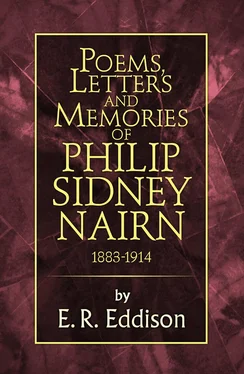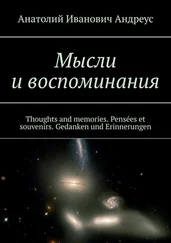Trinity at this time was in danger of becoming a somewhat ‘cliquey’ college. It had, three or four years earlier, been rescued from a threatened anarchy of rowdyism by its new Dean, Mr Michael Furse, now Bishop of Pretoria; and a tendency had become apparent among a certain section of the undergraduates to look upon themselves as the peculiar guardians of the corporate welfare. Among the freshmen of the year 1901 there grew up a group of friends, including many of the scholars and one or two of the best rowing men and football players of the year, between whom and the just persons of the senior years there arose a degree of estrangement based, no doubt, on mutual misunderstanding. This lack of good fellowship was doubtless very silly, very unjust, very unnecessary on both sides, as plenty out of each camp have since discovered. It was pronounced, however, when Nairn came up in 1902.
It was in 1901, and among what I may call the Caesarean as opposed to the Pompeian party, that the exclusive and august body known as the A.C. was founded. There were, I think, five original members, and the membership never went far beyond this. The initials stood for ‘Alpine Club’, the object of the society being primarily climbing in and out of Trinity and other colleges in the small hours. To the jaundiced eye, however, of second-year virtue the letters signified ‘Alcoholic Club’. That the principles of the body were anti-alcoholic I am certainly not so hardy as to allege. Its memory is enshrined in the famous Mitre Cup, the existence of which is due to Mr Raper: a name that few Trinity men – not I, at least – can pronounce without a feeling of the warmest admiration and affection. The cup commemorates the unexplained appearance one morning in the Garden Quad at Trinity of a stone mitre, an architectural feature of St John’s College, and its equally unexplained disappearance and return to its age-long abode during the following night. Nairn was elected to the A.C. soon after becoming a member of the college, and took no mean share in some of its most successful enterprises. I think he was there when the President missed his hold in the dark on a certain fall-pipe high aloft on the ‘overland route’, and had to be extricated from Balliol with a sprained ankle by means of sheets let down from a first-floor window looking on to Trinity quad. Other incidents are mentioned in his letters. In 1904 he writes:
‘The Alpine Dinner was a vast success, and also the flash-light photo thereof, but — and —, with their accustomed celerity, have not yet sent it me. To solemnise the occasion we lit an enormous bonfire in the middle of the Parks, which created intense scandalismos, and an unfortunate rencontre with a copper, suspicious of our numbers and presence at 4 a.m.’
In 1906 he writes:
‘I suppose you saw all about l’affaire Maurice . It may interest you to hear that I wasn’t in it (though I damned nearly was). Most of Trinity and no small part of the ’Varsity still think I was, however. So that spurious notoriety is descending upon me in my reprobate old age.’ fn1
Whether the Club survived into later years or ended its existence with the going down of those who constituted it in its prime, history relates not, nor is it relevant to this narrative.
Though his particular friends were identified with what has been referred to as the Caesarean camp, Nairn was persona grata with all sections of the College. His membership of the Rugby fifteen and of several of the college literary and debating societies, such as the Griffin (the official debating society of Trinity) and the Gondoliers (founded originally for the study of Gilbertian opera, but extending its patronage to a much wider range of dramatic literature), kept him in touch with the more orthodox elements. But the chief reason lay in his sunny and sociable disposition, the power of which no one who came into contact with him could long resist. Even the inner camp of irreconcilables unbent towards Nairn. In later years chance brought him into close relationship and good fellowship with some of those from whom college cliquishness had divided him at Oxford.
If the fascination of pleasant memories has trapped me into dwelling on the more ‘unbuttoned’ side of the Oxford days, it must not be thought that he neglected their quieter gifts. He was a great reader, and no term or vacation passed without adding a number – sometimes a dozen, sometimes a score – of entries to the list he kept of books read: a long and catholic list, dating back to his preparatory school-days when he was only ten years of age. The short stories of Guy de Maupassant, Swinburne’s Poems and Ballads , Meredith’s Shaving of Shagpat , and various plays of Shakespeare and other Elizabethan dramatists were among his favourite books first read during his ’varsity days. Many of these we discovered jointly, and read aloud together: some at Trinity on lazy afternoons, others at Mrs Honey’s among the Borrowdale mountains. He possessed the accomplishment, very rare because never taught, of reading aloud well, without monotony or affectation; and it was equally delightful to listen to his rendering of the musical cadences of lyric poetry, or to his declamation, in a swashbucklering style that was peculiarly his own, of the thunder-charged dialogue of Edward II or The Duchess of Malfi .
His literary tastes and accomplishments are matter for a later chapter. The name of Borrowdale brings me to two vacations spent at the Lakes, in the springs of 1905 and 1906. Our headquarters were at Green Bank, a house standing back on the hillside behind the farm of High Lodore, half a mile or so from the head of Derwentwater and the same distance from the little hamlet of Grange and the Gates of Borrowdale. Here, fortified by the hospitality and good cheer of Mrs Honey, we put in four hours’ reading at our text-books each morning, supplemented by a less defined period in the evenings, and spent the rest of the day in exploring the high fells between Skiddaw and Scafell. The charm of the Lake mountains cast its spell on Nairn. He writes in 1909 from Kota Bharu:
‘I’ve been thinking of you in the tail-end of this year, up at Mrs Honey’s, when the vile tourists have left only their traces behind on the fells and visitors’ books, and one can roam unoffended in the solitudes. Jucundum fuerit! Even in a glorious country like this, with the mountains all round, and the distant forests blue on the hillsides, or sailing on the sea in an open boat by night, with the stars reflected in the waters, and a cool breeze swelling the big sail – no, there is no moment like that on the high fells when the mists swirl and lift, and the dales appear in the sunlight below.’
One expedition stands out clearly in my recollection. After our morning’s work we set out, with the traditional change of stockings and a toothbrush, to climb Gable and the Pillar, descending to Wastdale Head, where we were to spend the night, and return by way of Eskdale next day. It was late spring and snow lay on the high mountains; the wind had blown the ice on a post planted in the cairn on Gable into feathers some inches long. Breasting the ridge of Greyknotts we encountered a hail-storm that whipped our right cheeks to the hue of the rowan berry, and as the storm passed the clouds divided and revealed the Pillar, dark and wild against a white mist, the teeth and edges of his black crags picked out with snow, the sky leaden above him, and a rainbow thrown across cloud and hill. It was then, I think, that Nairn fell in love with the Pillar, which he considered the finest of the Lake mountains. We stood on the top of it at sunset, looking down to the vast bulk of the Pillar Stone and the shadowy depths of Ennerdale far below it, and westward to Ennerdale Water coloured with the sunset. It was dark by the time we had descended the abrupt grassy sweeps of the Black Sail, and we stumbled among many walls and stony water-courses before we reached the inn at Wastdale Head, where, since we had beards and no luggage and were plainly dirty, we felt ourselves something less than honoured guests.
Читать дальше












